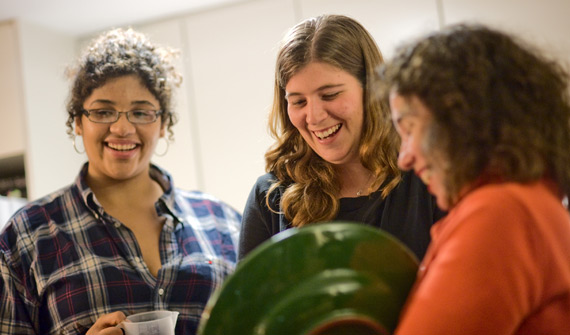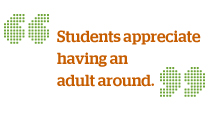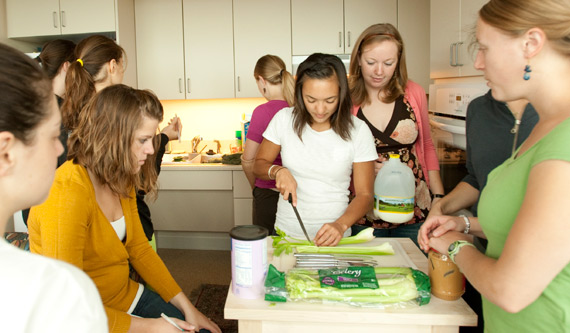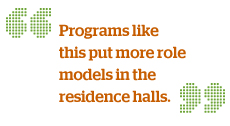Parent Magazine
BU’s Faculty-in-Residence program puts professors where the students are.
By Vicky Waltz
Photos by Kalman Zabarsky
Back in the ’70s, when Karen Jacobs was a student at BU, she didn’t live on campus. Then she decided to make up for lost time. When Jacobs moved to Boston from the suburbs seven years ago, she didn’t buy a fancy brownstone on Commonwealth Avenue. Instead, she settled in Warren Towers—one of the largest residence halls in the country, lodging about 1,800 freshmen. Last year, she relocated to the more luxurious Student Village II, better known as StuVi2, but her neighbors are still kids aged 18 to 22. The 60-year-old Jacobs doesn’t sweat the generation gap, though. “The students keep me young,” she says, laughing. “How else would I stay up-to-date on the latest music?”
A clinical professor of occupational therapy in Sargent College, Jacobs is one of 13 faculty members who make up BU’s Faculty-in-Residence (FIR) program. Designed to deepen the impact of teaching and research, FIR allows students and faculty to interact on an informal, day-to-day basis outside the classroom. “Students, particularly freshmen, are often intimidated by the concept of ‘The Professor,’” Jacobs says. “The Faculty-in-Residence program helps to demystify us.” Besides that, the program creates a warm, inviting environment for students. Jacobs (below, right) keeps her door open whenever she’s home and encourages students to drop by for homemade cookies and conversation. “I think students appreciate having an adult around,” she says.

 Research on student retention and academic success indicates that faculty-student interaction outside the classroom leads to a higher rate of student achievement, says Jacobs. “Programs like this put more role models in the residence halls.” “I am constantly amazed at how easy it is to develop relationships with these students and at how long they last across their collegiate experiences and beyond,” says Bryan Stone, associate dean at the School of Theology and Warren Towers resident. “There’s a ‘specialness’ to being able to see students outside the classroom, where they live, eat, and mix with one another, and to having some influence—sometimes small, sometimes bigger—in their lives,” adds Ed Downes, an associate professor of mass communication in the College of Communication, who lives at 10 Buick Street.
Research on student retention and academic success indicates that faculty-student interaction outside the classroom leads to a higher rate of student achievement, says Jacobs. “Programs like this put more role models in the residence halls.” “I am constantly amazed at how easy it is to develop relationships with these students and at how long they last across their collegiate experiences and beyond,” says Bryan Stone, associate dean at the School of Theology and Warren Towers resident. “There’s a ‘specialness’ to being able to see students outside the classroom, where they live, eat, and mix with one another, and to having some influence—sometimes small, sometimes bigger—in their lives,” adds Ed Downes, an associate professor of mass communication in the College of Communication, who lives at 10 Buick Street.
To take part in the program, which provides a rent-free living space and partial meal plan, professors are required to offer evening “open hours” and attend RA meetings. Jacobs holds a weekly “Test Kitchen,” teaching the culinarily-challenged how to prepare dishes other than ramen noodles.

“I think it’s important that students have some life skills before they graduate,” she says. “I want them to know how to cook, and more importantly, cook healthily.” They make potato latkes for Passover and fried samosas for Diwali. After dinner, she and the students often play board games. In keeping with her efforts to encourage healthy habits, Jacobs introduced a new activity last semester: sunrise yoga to help relieve stress and boost concentration. She even arranged for a masseuse to give students free massages during finals week.
 Other faculty members host Monday Night Football parties, community service excursions, and fishing trips to Gloucester.
Other faculty members host Monday Night Football parties, community service excursions, and fishing trips to Gloucester.
Diane Meuser, an associate professor of math and statistics in the College of Arts & Sciences who has participated in the program for more than 30 years, takes her students on annual hikes to New Hampshire’s Mount Monadnock and organizes bike rides to Concord and Lincoln. She also hosts homemade ice cream parties in her apartment, with such flavors as avocado, lemon meringue pie, and chocolate truffle.
“I like living on campus and being right in the middle of things,” she says. “It would be boring to live in the suburbs.”
Jacobs’s residents pitch in to help with some of her research projects, most notably one that determines the proper ergonomics for using a laptop computer. Partially conducted in Warren Towers, the study offers suggestions on how students can modify their laptops to function as desktop computer workstations. “Because laptop computers are so portable, students often use them on their beds and at tables,” she says. “As a result, some users are developing health problems like wrist, neck, shoulder, head, and back pain.” She is currently expanding the study to include information about iPads and iPhones.
But Jacobs doesn’t see her residents as research subjects. “The students and I, we’re a family,” she says. And she means that quite literally. “My son was a freshman during my first year at Warren Towers,” she recalls, “and I introduced him to a young woman on my floor. They fell in love, got married, and now I have a grandchild.” ■







October 20, 2011
I particularly like the sentence, “…I think students appreciate having an adult around,”
The novelty of being alone away from home wears off and this is where the FIR program is invaluable.
My freshman daughter is at Warren – who is the resident prof there this year? :)
thanks, anu
October 23, 2011
Our senior daughter is now an RA at Warren. Does this program also benefit the RAs in any specific way? I could see how the FIR program could offer the RAs support as well.
October 22, 2011
What a blessing it is to read about this program. I had no idea that some professors live in the residences with the students. I definitely believe that our children like having an adult around so they can be kids sometimes. It’s wonderful to know that there is an adult where you live who the kids know is a responsible adult and can reaffirm right from wrong, if they occasionally forget.
I like everything I have read about this program and feel as though the professors who can do this, and are doing it happily, are giving our children such a special gift.
It is hard for a parent such as myself to raise a daughter for 18 years, and then suddenly, she’s moved to Boston from New York and is living on her own. I have worried everyday that she has been away.
However, knowing that there are not only adults but professors living where she is makes me feel so much better. Having a few sets of adult eyes and ears around her is just what the doctor ordered for this mom.
Thanks so much for making such a difference. Tonight I think I can actually rest for the first time since she has been gone after reading this. I am so happy that I registered to get this magazine and follow BU on FB.
December 12, 2011
I think this program is another great way that BU reaches out to the students at all levels. The funny thing a few days after I read this article my son Justin called me and told me he has been attending Professor Jacobs cooking lessons and I thought this is just great. He enjoys the time and it is a great stress buster; plus he promised to cook something when he comes home for Christmas break.